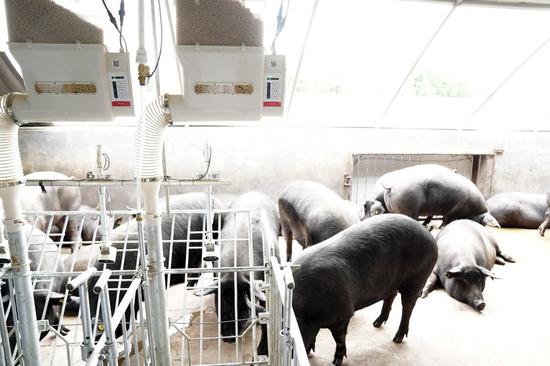Smart tech helps whole-hog reshaping of China's pig-raising industry

An intelligent stock breeding system at a pig farm in northeast China's Jilin Province, on June. 14, 2019. (Xinhua/Jin Liangkuai)
Face and sound recognition, robot assistants, cameras, sensors, blockchain. These new technologies are breaking the stereotype of stinky, messy pig farms and transforming China's pig-raising industry.
In a pig farm of Jingqishen Organic Agriculture Co., Ltd. in northeast China's Jilin Province, a specially designed 3D camera overhead can recognize the number of pigs in the pen with a single scan. With the "pig face recognition" technology, each pig can be accurately identified by the feeding robot, which in turn offers individualized feeding plans.
Sun Yanchun, CEO of the company, said they have cooperated with JD Digits to upgrade their pig farm with an intelligent stock breeding system.
The system functions as a "24-hour working veterinary." With voice recognition technology, the system analyzes the oinks of pigs and combines other data such as body temperature and food intake for disease detection, offering early warnings for the feeders to take action.
Sun said more than 200 pig houses have been upgraded with the intelligent system in their breeding bases, which produce 200,000 pigs per year. The number is expected to reach one million in three years.
The intelligent system has helped bring down the pig-raising cost, with an estimated 18 million yuan (about 2.56 million U.S. dollars) being saved per year. The accurate feeding system saved about 10 percent of the pig feed, and lowered the labor cost and reduced the damage caused by epidemics, Sun said.
It also helped ensure better pork quality due to a more balanced nutrient intake of pigs and less drug use throughout their life cycle, Sun added.
New technology such as artificial intelligence and blockchain has shown potential in transforming the pig-raising industry, according to a report on China's smart pig farming released by the Agricultural Information Research Institute.
Pig identification is the basis to achieve precision management of a farm. Every pig has its own ID and information including breed, weight, feeding and estrous cycle recorded. The temperature, moisture and lighting can be tuned in real time, and the system will draw a growth curve for every pig, providing a reference for precision breeding.
With cameras, sensors and other Internet of Things devices planted in pigpens, any deviation from the ideal situation can be monitored real-time and measures can be taken to prevent harm at the earliest possible instance.
Blockchain technology has also become a natural fit for smart pig farming.
All information can become part of the blockchain ledger, with every participating node receiving updates. Blockchain becomes a source of truth about the condition of the farm, inventory, distribution, as well as details from breeding to piglet birth to slaughter. Unusual events in the pig and pork supply chain can be immediately notified and effectively controlled.
As the demand for organic and premium quality products grows, pig farmers also have incentives to showcase a pig's journey from farm to table. Blockchain's transparency and tamper-proof nature allow farmers to not only meet regulations but consumer expectations as well.
Li Jialong, deputy general manager of JD Digit's agriculture and husbandry unit, said intelligent farming systems may support high-quality development of China's agriculture and husbandry.
"Digital technology can also be used in the whole industrial chain. For example, we are exploring ways to adopt blockchain technology in the traceability system for pork quality and safety," Li said.
China, with a population of 1.4 billion, is the world's largest pork producer and consumer, where hog production accounts for about half of the world's total and pork accounts for 62.7 percent of residents' meat consumption. Chinese tech giants and startups have been deploying the latest technologies in the industry.
In 2018, Aliyun, Alibaba's cloud computing subsidiary, teamed up with livestock farming companies in Sichuan Province to build an AI system that can keep a record of every single hog.
Yingzi Technology, a start-up company based in Guangzhou, has dedicated itself to intelligent farming since it was established in 2017. It has rolled out new technologies such as pig facial recognition and Future Pig Farm, an integrated system that can make pig farms easier to monitor and manage.
A demonstration project was adopted by Yangxiang Co., Ltd., which boasts a 13-story high-rise hog hotel in south China's Guangxi Zhuang Autonomous Region.
According to He Jingxiang, CEO of Yingzi Technology, they are also harnessing the 5G network to make the intelligent system more smooth and efficient.
"We have cooperated with China Mobile's Guangxi Branch to set up a 5G network base station in the pig farm, facilitating the cloud management of pig production," He said.
Yingzi Technology has cooperated with universities and institutions such as Huazhong Agricultural University and Wuhan University in developing technologies for the pig-raising industry.
"We are also working with Dutch agricultural companies such as Microfan in developing advanced technologies for environmental control of pig farms and livestock management," He said.
